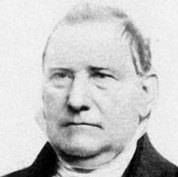 Recently, the student government at the University of Cincinnati asked the board of trustees to remove the name of Charles McMicken from the university’s college of arts and sciences. This spring the university will decide if it should continue to honor McMicken, a former slave-owner and founder of the university.
Recently, the student government at the University of Cincinnati asked the board of trustees to remove the name of Charles McMicken from the university’s college of arts and sciences. This spring the university will decide if it should continue to honor McMicken, a former slave-owner and founder of the university.
 When McMicken died in 1858, he left money and property to the city of Cincinnati “to found an institution where White boys and girls might be taught.” He also left provisions to free his slaves and send them to a parcel of land in Liberia. It is thought that McMicken fathered children with enslaved women. The university has put together a commission of professors and outside experts who will spend the semester deciding what to do about McMicken’s legacy on campus.
When McMicken died in 1858, he left money and property to the city of Cincinnati “to found an institution where White boys and girls might be taught.” He also left provisions to free his slaves and send them to a parcel of land in Liberia. It is thought that McMicken fathered children with enslaved women. The university has put together a commission of professors and outside experts who will spend the semester deciding what to do about McMicken’s legacy on campus.
“Challenging conversations have the potential to divide us,” Neville Pinto, president of the University of Cincinnati, wrote in a news release. “But our shared commitment to this great institution, despite its imperfect history, must keep us united and undeterred in our efforts to advance knowledge, change lives and build community.”


I think the Slave-Owning Founder’s name should remain visible at UC in order to engender a more perfect conversation about the truer history of America. Turning the old boy’s legacy inside out may help us unravel the hidden but powerful remnants of patriarchal capitalism, white supremacy and post-traumatic slavery syndrome, which I believe remains a real thing!